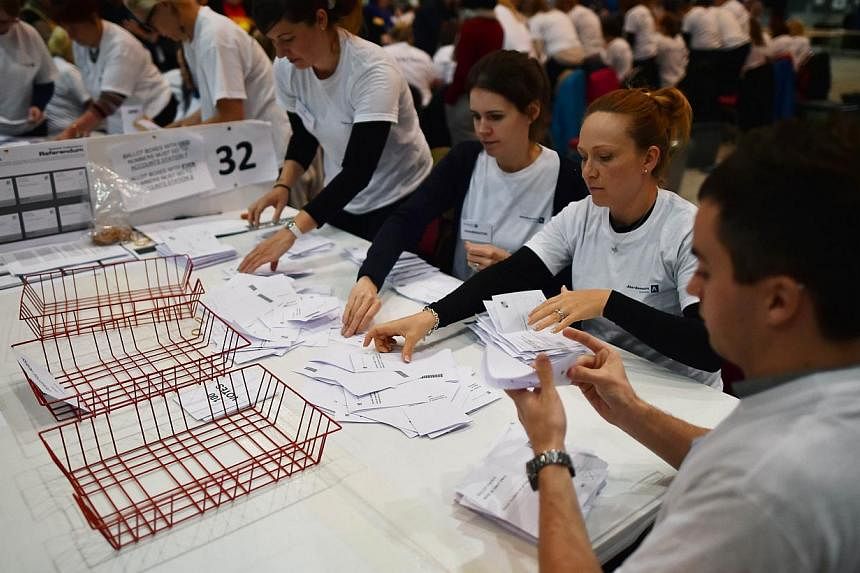LONDON - The first exit poll from Scotland's independence referendum, where ballot stations closed at 5 am Friday Singapore time, suggests that 54 per cent of voters appear to have rejected the option of leaving the United Kingdom.
"At the risk of looking utterly ridiculous in a few hours' time, I'd say it's a 99 per cent chance of a 'No'", Mr Peter Kellner who runs YouGov, one of Britain's most trusted polling agencies, told the BBC, the country's state-funded broadcaster.
But most British politicians are still holding their breath, refusing to trust any electoral prediction. For they know that the Scottish referendum has no comparison in British history and that, therefore, any projection from a pollster should be taken with a large pinch of salt.
Turnout of the vote - which is not compulsory - was nevertheless exceptionally high, with over 90 per cent of the 4.6 million Scots entitled to vote casting their ballots. This beat the previous historic record of 83 per cent voters' participation achieved more than half a century ago, in the British general elections of 1950.
Nobody knows how such a high turnout would impact on the outcome of the vote. Scottish nationalists supporting independence believe that this works in their favour, since the young and the less educated who are known to favour Scotland's separation in larger numbers are also those who are statistically less likely to vote.
But Mr Alastair Darling, a former British finance minister who ran the "Better Together" campaign opposing Scottish independence claims that many of those who turned out to vote did so because they were alarmed by the realistic prospect of the break-up of the United Kingdom. As polls closed, Mr Darling claimed that voting was disproportionately high in the rich residential areas of the big cities, where the electorate is known to oppose Scotland's separation from the rest of the United Kingdom.
Ballots are being counted throughout the night in Scotland, with results being declared in each one of the 32 Scottish regions as they become available. The final tally is not scheduled to be made available before 2 pm Singapore time.
And many of the first results to be declared in the next few hours will not be representative: these will include Scotland's small islands in the North and Irish Seas which are likely to opt for the nationalists, as well as the lush, expansive but sparsely-populated southern counties of Scotland which are likely to be strenuously opposed to independence.
The real indicator of the final results will only come when figures are released for the voting in Edinburgh and Glasgow, Scotland's biggest cities which between them account for more than half of all voters.
Prime Minister David Cameron and his ministers have indicated that they won't be making a statement before the final results are declared. So most ordinary Britons still went to bed unsure whether by the time they wake up, they'd start their new day in the same country.

